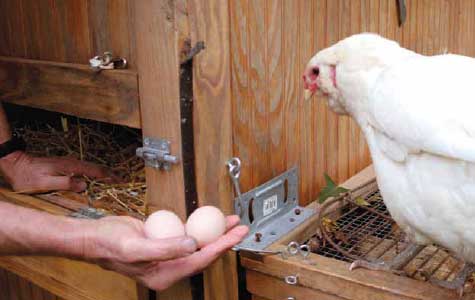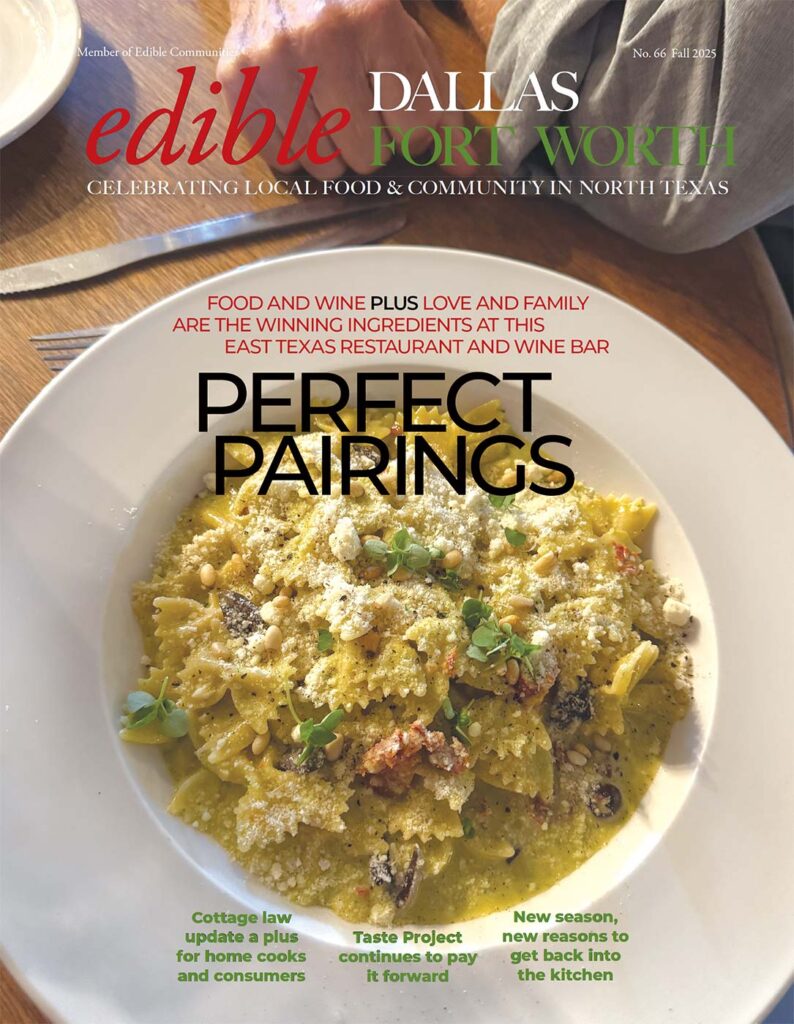
Photos by Karen McCullough & Richard Adams
Let me just start by saying I’m so proud of Dallas. In my opinion, the residents of our city took a big step forward in 2009 by embracing the concept of urban farming. While it may not yet be mainstream in Big D, we are getting there. Newbie vegetable gardeners are coming out of the woodwork and the backyard chicken movement continues to gain momentum. There is no reason that city dwellers can’t or shouldn’t grow and raise some of our own local food as part of a sustainable way of life. Vegetable gardening, composting and raising small livestock are vital components of a healthy lifestyle, not to mention a healthy community. According to the recent Report of the Council on Science and Public Health put out by the American Medical Association, creating local sources of organic, natural and sustainable food is key to public health in America. Raising backyard flocks of hens for fresh egg production is part of a sustainable food system.
Knowing exactly where your food comes from is comforting, to say the least. Knowing how your food is treated while it’s alive is even better. Because eggs are my primary source of animal protein, it’s important for me to know that the chickens that produce them have a happy and healthy life. Keeping and caring for my own chickens is the best way for me to ensure they do. It also enables me to control what goes into the eggs I eat by what I feed my chickens. Chickens love to eat grass and greens and they forage for insects and worms. When they get a natural diet plus lots of healthy sunshine, the result is fresh, tasty and highly nutritional eggs that you can feel really good about eating.
There is a big difference between a store-bought and a farm fresh egg. Factory farmed chickens are confined to small spaces with no access to the outdoors. Precious sunlight and foraging are not a part of their lives. They are fed grain feed and the nutritional value of their eggs reflects these circumstances. Our options have improved now that grocery stores carry more organic and free-range eggs, but even chickens raised in large-scale “organic” or “free-range” operations may be confined with limited outdoor access for a majority of their lives. As a result, a typical grocery store egg tends to be somewhat runny, with a pale yellow yolk. In contrast, crack open a “yard egg” and you’ll find a dense, firm white and a bright orange yolk. Yard eggs typically contain 25 percent more vitamin E and a third more vitamin A, and that beautiful orange color comes from an extra 75 percent of beta-carotene. They can also contain significantly higher levels of omega-3 fatty acids than factory farmed eggs.
Flavor is also a big factor. If you’ve never tasted a farm fresh egg, you’re really missing out. You will find that fresh backyard eggs have a nice hearty flavor and a much denser consistency than store-bought eggs. Store-bought eggs aren’t as fresh as most of us would like them to be; days or even weeks old is common. As the eggs age, air penetrates the shell, which breaks down the flavor, nutritional content and consistency of the egg.
Whether you started out growing organic vegetables and now want to add chickens to your backyard garden, or vice versa, the two go together like peas in a pod. Once you throw in composting, which is a must if you’re gardening, you can get pretty close to what I like to call a close-looped system. You and your chickens get fresh veggies from the garden and the leftovers and expired crops go into the compost. All the waste from your chicken coop, such as old bedding and manure, goes right into the compost as well. The finished compost becomes an excellent amendment for your garden beds. Waste not, want not.
Chicken manure is one of the best natural sources of Nitrogen and makes an excellent fertilizer, especially for vegetable gardens. Dog and cat feces contain E. coli, which can contaminate city water sources and your vegetable crops, but chicken manure does not. If you’ve ever struggled with getting your compost to break down quickly enough, you’ll find chicken manure to be just the jump-start you need.
Did I mention that keeping your own chickens is also a lot of fun? You’ll find that each breed and individual chicken has its own distinct personality. They’ll quickly become just as much a part of the family as your favorite dog or cat, and as a bonus, these gals will provide you with breakfast every morning. Keeping backyard chickens is a great outdoor family activity and it helps teach kids where their food comes from. Daily maintenance takes only about five minutes, but you’ll find you want to spend much more time with your birds. Hens are relatively quiet and by spending about 30 minutes a week tending your flock, you will avoid a dirty, smelly coop. When you care for your urban flock responsibly, raising backyard chickens can also be a great way to bond with neighbors and community. The deal with my next-door neighbors? They babysit, they get the eggs!
If you’ve been thinking about keeping backyard chickens but haven’t yet taken the plunge, here are a few things to consider. Do your research and check animal ordinances in your city. The city of Dallas only has one restriction: No Roosters. Other cities have different restrictions, so you need to make sure you’re in compliance with code. No, you don’t need a rooster to get eggs because hens will simply lay unfertilized eggs for you to harvest. Keep at least two birds, as they are social animals. You’ll need to buy or build a dwelling that offers about 2 square feet of roosting space per bird and at least 4 square feet of ground or “run” space per bird. Keep in mind we have lots of hawks in North Texas, so providing a covered run is the best way to protect your flock from predators. Once of age, hens can lay an egg a day depending on the breed. Production usually tapers off after several years, but that also depends on the breed and health of the individual bird. Chickens can live up to 8 to 10 years in a well-tended backyard flock, so be prepared to keep birds as pets once they’ve stopped laying. Attend local programs and club meetings to learn all the ins and outs of keeping a successful backyard flock and you’ll be on your way to fresh yard eggs in no time.
BORN TO BROOD
Custom Chicken Coops
A slowdown in the economy and her own backyard flock grew into a business for Chere Hickock, former animal talent agency owner and now proud owner of The Custom Coop Company, Cool Casas for City Chickens.
Hickock and her carpenter design and build the coops from recycled and salvaged materials. Business is geared toward families who want to keep backyard chickens, but move beyond the portable or prefab coops.
They come with the ability to be turned into a clever garden shed if you decide to sell your house or your chickens.
And because chickens and compost are a match made in heaven, Hickock brings all of this into your own personally designed chicken coop for keeping and harvesting your own farm fresh eggs.
The Custom Coop Company
Cool Casas for City Chickens
469.576.3988
SPRING CHICKEN COOP TOURS
Peep at the Coops, the first annual urban chicken coop tour, is scheduled for April 18 with a rain date of April 25. The tour will include up to 10 urban coops that will run the gamut from a simple pre-built shed modified to keep chickens, to elaborately designed chicken whimsies.
The mission is to encourage and excite people who may have never thought about keeping chickens and to reinforce die-hard enthusiasts that just have “coop” lust.
Knowledgeable volunteers will be at each site to answer questions and talk chicken. Many of those engaged in raising chickens will share their other sustainable practices such as rainwater harvesting, beekeeping, BioPods, composting and even goat raising.
T-Shirts with our logo will be available to buy along with a raffle that includes great prizes, chicken oriented and otherwise.
For more information contact Carolyn Bust at chrysalisbutterfly@att.net
A SECOND TOUR SPONSORED BY SLOW FOOD DALLAS
Slow Food Dallas will be sponsoring a chicken coop tour as a fundraiser in May of this year. Details are still being finalized, but the tour will include Oak Cliff coops. Check their website for full details as they emerge.
Find Out More About Keeping Your Own Chickens:
Backyard Poultry Magazine: A good resource to help you answer questions about your flock. This bimonthly publication has information on raising, breeding, marketing and housing chickens and more. www.backyardpoultrymag.com
BioPods: Harvesting the power of the black soldier fly to recycle your household scraps into a nutritious treat for your chickens. To learn more, visit their website at www.theBioPod.com
www.growlively.typepad.com: Leslie’s blog about her own flock of urban chickens that she keeps in her backyard in East Dallas.
North haven Gardens: Once a month hen sales, coops, conventional and organic feeds, waterers, feeders, books and supplements. Workshops and education programs are also offered. Check their website at www.nhg.com
LESLIE FINICAL HALLECK received her B.S. in Biology/Botany from University of North Texas and her M.S. in Horticulture from Michigan State University. From 1992- 1996, she worked garden center retail and ran her own small gardening business. In 1998, she joined the Dallas Arboretum, first as Curator of Plants and then Director of Horticulture Research, a joint position with Texas A&M University. In 2005 she joined North Haven Gardens in Dallas as their General Manager. Over the last 13 years, she’s written for scientific, trade and popular garden publications and regularly lectures and teaches gardening programs. www.growlively.typepad.com/
- Leslie Finical Halleckhttps://www.edibledfw.com/author/lfhalleck/
- Leslie Finical Halleckhttps://www.edibledfw.com/author/lfhalleck/
- Leslie Finical Halleckhttps://www.edibledfw.com/author/lfhalleck/
- Leslie Finical Halleckhttps://www.edibledfw.com/author/lfhalleck/





